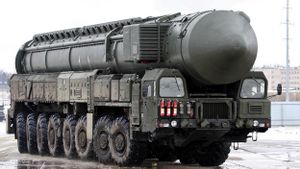JAKARTA - Israeli authorities are rumored to be approving a ceasefire plan with Lebanese militant group Hezbollah, with an official saying there was no other choice but to accept it with the consideration of fear of being punished by the United States.
Prime Minister Benjamin Netanyahu will hold a high-level security cabinet meeting in Tel Aviv on Tuesday evening to agree a 60-day ceasefire with the Hezbollah group after more than a year of war, an Israeli official told The Times of Israel, as quoted November 26.
At the same time, the official stressed Israel accepted the end of hostilities, but not the end of the war on Hezbollah.
"We don't know how long it will last," the official said of the ceasefire, quoted by The Times of Israel November 26.
"It could be a month, it could be a year," he continued.
Israel's freedom to act in Lebanon after a ceasefire was secured by a letter between Israel and the US, the official said.
The Israeli military (IDF) will be able to operate not only against those who try to attack Israel, but also against Hezbollah's efforts to build on its military force.
"We will act," the official promised.
He explained that Israel had no choice but to accept a ceasefire, fearing US President Joe Biden's administration could punish Israel with United Nations Security Council resolutions in the final weeks.
Israel also lacks the capabilities it needs from the US, including 134 D9 bulldozers, the official said.
Meanwhile, a Lebanese official said Beirut had been informed by Washington that the deal could be announced "in a few hours."
Israeli officials have previously said the deal to end the war was imminent, although some issues still exist, while two senior Lebanese officials voiced cautious optimism, even as Israeli attacks hit Lebanon.
Despite the movement to stop fighting, both Israel and Hezbollah continued to shoot each other on Monday.
IDF's Domestic Front Command issued new restrictions in parts of northern Israel on Monday evening, given concerns that Hezbollah would step up rocket attacks before the ceasefire took effect.
If attempts to reach a ceasefire fail, said Channel 12, the IDF has plans to expand its operations in Lebanon.
Earlier on Monday, National Security Minister Itamar Ben Gvir asked Netanyahu to reject the ceasefire's proposal, calling it a "big mistake," although, unlike in the past, he would not threaten to bring down the government if approved.
In a post on X, ultranationalist party leader Otzma Baddit warned, accepting a ceasefire deal meant losing a "historic" opportunity to destroy Iran-backed terrorist groups.
He urged Netanyahu to "turn the commanders fighting on the pitch exactly now, when Hezbollah was defeated and missed a ceasefire, it was forbidden to stop."
Ben Gvir himself has firmly opposed any deal that would stop the fighting, even temporarily, both in Gaza and Lebanon, and has threatened more than once to withdraw his party from the coalition if Israel signs a ceasefire agreement.
The ceasefire will eventually be approved, Israeli officials speaking to The Times of Israel: "There are ministers who speak to their bases, and we are considering them. But Ben Gvir understands the importance of it. It is in Israel's interest."
SEE ALSO:
The official also argued that the ceasefire would help achieve a successful end to the war in Gaza against Hamas.
"What Hamas wants is support from Hezbollah and other parties. Once you cut ties, you have the ability to reach an agreement. That is a strategic achievement," the official said.
"Hamas alone," he said.
The English, Chinese, Japanese, Arabic, and French versions are automatically generated by the AI. So there may still be inaccuracies in translating, please always see Indonesian as our main language. (system supported by DigitalSiber.id)


















